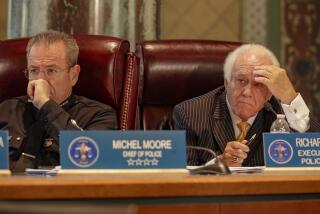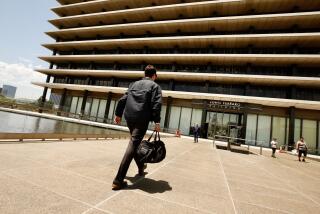Suit says Lake Forest’s day-laborer law is illegal
Controversy surrounding a Lake Forest day-laborer site took a new turn Friday as the American Civil Liberties Union announced it had filed a federal lawsuit against the city for maintaining an ordinance found unconstitutional in Los Angeles County.
The ACLU alleged in court papers filed in U.S. District Court in Santa Ana that Lake Forest’s municipal code that prohibits workers from seeking employment on the street or potential employers hiring from their cars was unconstitutional.
Similar local laws have been struck down in Redondo Beach and Glendale.
“The workers have the right to stand on the sidewalk and announce their availability for work just as a political activist can stand on the sidewalk and hold up a sign,” said ACLU attorney Nora Preciado at a news conference Friday in front of Lake Forest City Hall. She was surrounded by two dozen workers who held colorful signs with messages in Spanish such as “We are workers, not criminals.”
City Atty. Scott Smith called the lawsuit’s allegations “baseless and wrong.”
He said Lake Forest officials are not enforcing the law, which was approved in 1993, and they plan to eliminate it from their books when the municipal code is revamped this spring.
The workers, said Mayor Richard T. Dixon, “can stand on sidewalks until the cows come home.”
The workers disagree. ACLU Orange County Director Hector Villagra said at least 10 people have been given citations under the ordinance in the last five years.
In addition, Villagra said sheriff’s deputies are intimidating the workers by telling them to leave the city and go back to their countries, citing them when they stand on the sidewalk and surrounding and sometimes ticketing the cars of potential employers.
City officials “say they aren’t enforcing this but, in reality, they are doing what it takes to drive these workers away,” Preciado said.
The deputies have cracked down on day laborers at El Toro and Jeronimo roads in the last month in response to resident complaints, said Sheriff’s Lt. Jay LeFlore, the city’s chief of police services. LeFlore said if the men were just looking for work, there would not be a problem. However, he said, some urinate and drink in the area and cause disturbances.
Preciado said the lawsuit “is about the rights of the workers. Their immigration status is unrelated. Every person living in this country is protected under the 1st Amendment.”
In December, Lake Forest officials agreed to let a private security guard file trespassing complaints on behalf of property owners, clearing the way for deputies to make arrests. The guard is paid by property owners.
LeFlore said deputies repeatedly visited the site before the security guard began his work in January to explain to workers the ordinance that prohibits the laborers from standing on private property. He could not immediately say how many men had been arrested in the last month.
Gustavo Vasquez, 29, said he had been arrested twice at the site since January, spending 10 hours in Orange County Jail each time.
The first time, in January, Vasquez said, he left a Mexican restaurant in a shopping center and was headed to the adjacent sidewalk where the day laborers regularly stand when he was stopped by police and handcuffed. He said he does not know the charge.
“I tried to explain that I had just come from a restaurant, but I don’t think they understood me,” said Vasquez, in Spanish.
He added that he came to Lake Forest 18 months ago from Guatemala, where he has a wife and two children.
In the second case, last month, documents show Vasquez was charged with trespassing. He said he stepped 10 feet into the private parking lot of the strip mall in response to a driver’s offer of work and got into the car.
The driver was pulled over and ticketed, he said. Vasquez was taken to the county jail.
LeFlore said Vasquez might have been taken to the jail because he did not have identification or because he was likely to continue the illegal behavior.
“I don’t know what was so bad with what I did,” Vasquez said. “I do know that what we are trying to do is to work and there doesn’t seem much crime in that to me.”
More to Read
Sign up for Essential California
The most important California stories and recommendations in your inbox every morning.
You may occasionally receive promotional content from the Los Angeles Times.










